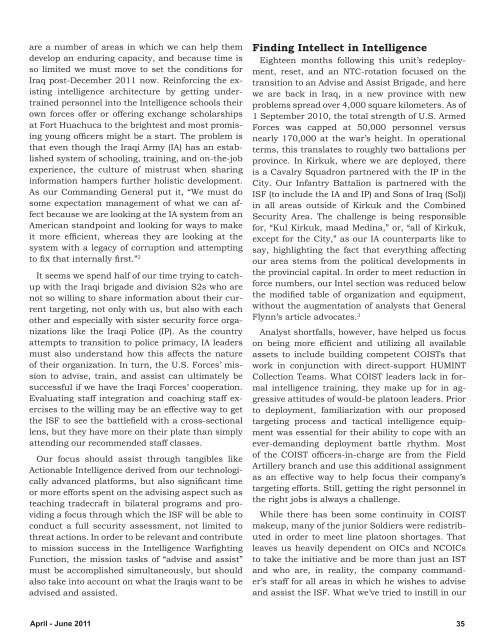George w. casey jr. - Federation of American Scientists
George w. casey jr. - Federation of American Scientists
George w. casey jr. - Federation of American Scientists
Create successful ePaper yourself
Turn your PDF publications into a flip-book with our unique Google optimized e-Paper software.
are a number <strong>of</strong> areas in which we can help them<br />
develop an enduring capacity, and because time is<br />
so limited we must move to set the conditions for<br />
Iraq post-December 2011 now. Reinforcing the existing<br />
intelligence architecture by getting undertrained<br />
personnel into the Intelligence schools their<br />
own forces <strong>of</strong>fer or <strong>of</strong>fering exchange scholarships<br />
at Fort Huachuca to the brightest and most promising<br />
young <strong>of</strong>ficers might be a start. The problem is<br />
that even though the Iraqi Army (IA) has an established<br />
system <strong>of</strong> schooling, training, and on-the-job<br />
experience, the culture <strong>of</strong> mistrust when sharing<br />
information hampers further holistic development.<br />
As our Commanding General put it, “We must do<br />
some expectation management <strong>of</strong> what we can affect<br />
because we are looking at the IA system from an<br />
<strong>American</strong> standpoint and looking for ways to make<br />
it more efficient, whereas they are looking at the<br />
system with a legacy <strong>of</strong> corruption and attempting<br />
to fix that internally first.” 2<br />
It seems we spend half <strong>of</strong> our time trying to catchup<br />
with the Iraqi brigade and division S2s who are<br />
not so willing to share information about their current<br />
targeting, not only with us, but also with each<br />
other and especially with sister security force organizations<br />
like the Iraqi Police (IP). As the country<br />
attempts to transition to police primacy, IA leaders<br />
must also understand how this affects the nature<br />
<strong>of</strong> their organization. In turn, the U.S. Forces’ mission<br />
to advise, train, and assist can ultimately be<br />
successful if we have the Iraqi Forces’ cooperation.<br />
Evaluating staff integration and coaching staff exercises<br />
to the willing may be an effective way to get<br />
the ISF to see the battlefield with a cross-sectional<br />
lens, but they have more on their plate than simply<br />
attending our recommended staff classes.<br />
Our focus should assist through tangibles like<br />
Actionable Intelligence derived from our technologically<br />
advanced platforms, but also significant time<br />
or more efforts spent on the advising aspect such as<br />
teaching tradecraft in bilateral programs and providing<br />
a focus through which the ISF will be able to<br />
conduct a full security assessment, not limited to<br />
threat actions. In order to be relevant and contribute<br />
to mission success in the Intelligence Warfighting<br />
Function, the mission tasks <strong>of</strong> “advise and assist”<br />
must be accomplished simultaneously, but should<br />
also take into account on what the Iraqis want to be<br />
advised and assisted.<br />
Finding Intellect in Intelligence<br />
Eighteen months following this unit’s redeployment,<br />
reset, and an NTC-rotation focused on the<br />
transition to an Advise and Assist Brigade, and here<br />
we are back in Iraq, in a new province with new<br />
problems spread over 4,000 square kilometers. As <strong>of</strong><br />
1 September 2010, the total strength <strong>of</strong> U.S. Armed<br />
Forces was capped at 50,000 personnel versus<br />
nearly 170,000 at the war’s height. In operational<br />
terms, this translates to roughly two battalions per<br />
province. In Kirkuk, where we are deployed, there<br />
is a Cavalry Squadron partnered with the IP in the<br />
City. Our Infantry Battalion is partnered with the<br />
ISF (to include the IA and IP) and Sons <strong>of</strong> Iraq (SoI))<br />
in all areas outside <strong>of</strong> Kirkuk and the Combined<br />
Security Area. The challenge is being responsible<br />
for, “Kul Kirkuk, maad Medina,” or, “all <strong>of</strong> Kirkuk,<br />
except for the City,” as our IA counterparts like to<br />
say, highlighting the fact that everything affecting<br />
our area stems from the political developments in<br />
the provincial capital. In order to meet reduction in<br />
force numbers, our Intel section was reduced below<br />
the modified table <strong>of</strong> organization and equipment,<br />
without the augmentation <strong>of</strong> analysts that General<br />
Flynn’s article advocates. 3<br />
Analyst shortfalls, however, have helped us focus<br />
on being more efficient and utilizing all available<br />
assets to include building competent COISTs that<br />
work in conjunction with direct-support HUMINT<br />
Collection Teams. What COIST leaders lack in formal<br />
intelligence training, they make up for in aggressive<br />
attitudes <strong>of</strong> would-be platoon leaders. Prior<br />
to deployment, familiarization with our proposed<br />
targeting process and tactical intelligence equipment<br />
was essential for their ability to cope with an<br />
ever-demanding deployment battle rhythm. Most<br />
<strong>of</strong> the COIST <strong>of</strong>ficers-in-charge are from the Field<br />
Artillery branch and use this additional assignment<br />
as an effective way to help focus their company’s<br />
targeting efforts. Still, getting the right personnel in<br />
the right jobs is always a challenge.<br />
While there has been some continuity in COIST<br />
makeup, many <strong>of</strong> the junior Soldiers were redistributed<br />
in order to meet line platoon shortages. That<br />
leaves us heavily dependent on OICs and NCOICs<br />
to take the initiative and be more than just an IST<br />
and who are, in reality, the company commander’s<br />
staff for all areas in which he wishes to advise<br />
and assist the ISF. What we’ve tried to instill in our<br />
April - June 2011 35















